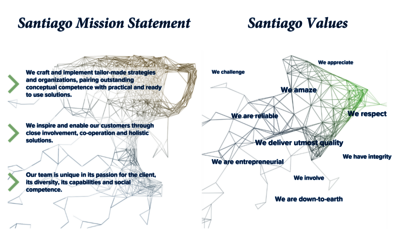“Corporate Purpose” has become one of the most cited developments amongst HR trends. The rationale of own actions has gained importance through the pandemic. Applicants from generation Y and Z are said to set value on meaningful work and select potential employers according to the fit of their personal and the company’s “Why”. Moreover, employees from other generations quit their jobs in order to “do something more meaningful”. The significance of the trend is underlined by the fact that many specific transformation programs have been kicked-off – from service providers like KPMG (“higher purpose initiative”) to production companies like Mercedes (“purpose initiative”).
What is “Corporate Purpose”?
Many people talk about it, often in flowery words. There are many explanations and definitions. Some authors emphasize the social and ethical responsibility of companies. Others highlight the identity and the creation of meaning. A third group of authors underlines the need to create value. A common denominator behind the different definitions is, that a “Corporate Purpose” describes the big Why of a company - its objective.
It explains the philosophy behind the business model, the meaningful essence of the company and the guiding maxim for every economic action of the organization. Simply put, purpose is a definitive statement about the difference a company is trying to make in the world (Globeone). So far, so good.
The Challenge of Why, What and How
However, formulating a credible purpose statement is challenging. The reason is simple: The “big Why” consists out of two components: The “What” and the “How”. The “What” of a car producing company could be “to produce the best sport cars in the world”. The “How” describes, how they do it: E. g. by using renewable energies and raw materials, by considering the working conditions of the workers in the supply chain, etc.. The common definition of “Corporate Purpose” mixes these two components up under one headline. To follow this mixed-up “Corporate Purpose” definition could thus easily lead into a dead end: The result is very often perceived as pure marketing and not credible at all (e.g. if a car producer tries to explain that it is no longer a car producer).
Santiago and “Corporate Purpose”
How did we detect these weaknesses? We tried to define our own “Corporate Purpose”. The discussion was short and the result quite simple: We want to make our customers more successful. But is that a “Corporate Purpose” according to the common definition? Obviously not. Sometimes we cover social and ecological questions in our projects, but very often not. Are we now a company without future, no longer prepared to meet the requirements of the new time? We think no!
We defined an additional mission statement that defines “what” we want to do. And there is still the “how”: We will do our business by following our company values and the measures of our sustainability program “Project Zero” and thus we will take care of social and ecological topics.
In a nutshell: We are convinced that it`s more honest and credible to stick to the “What” (Mission) and the “How” (Values) than to develop artificial “Whys” (Purpose) only because it`s currently a hot trend.
Sometimes it`s helpful to follow our grandma`s advice: Don`t be the first to follow the crowd!


